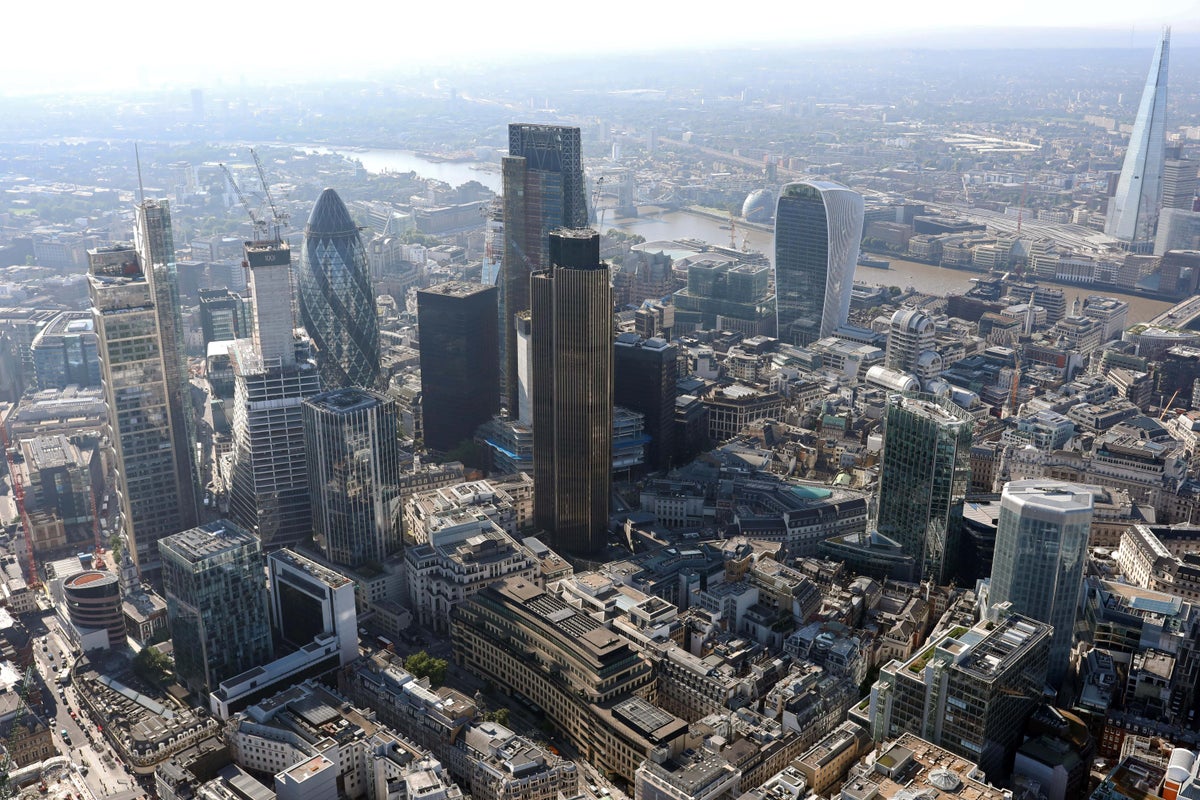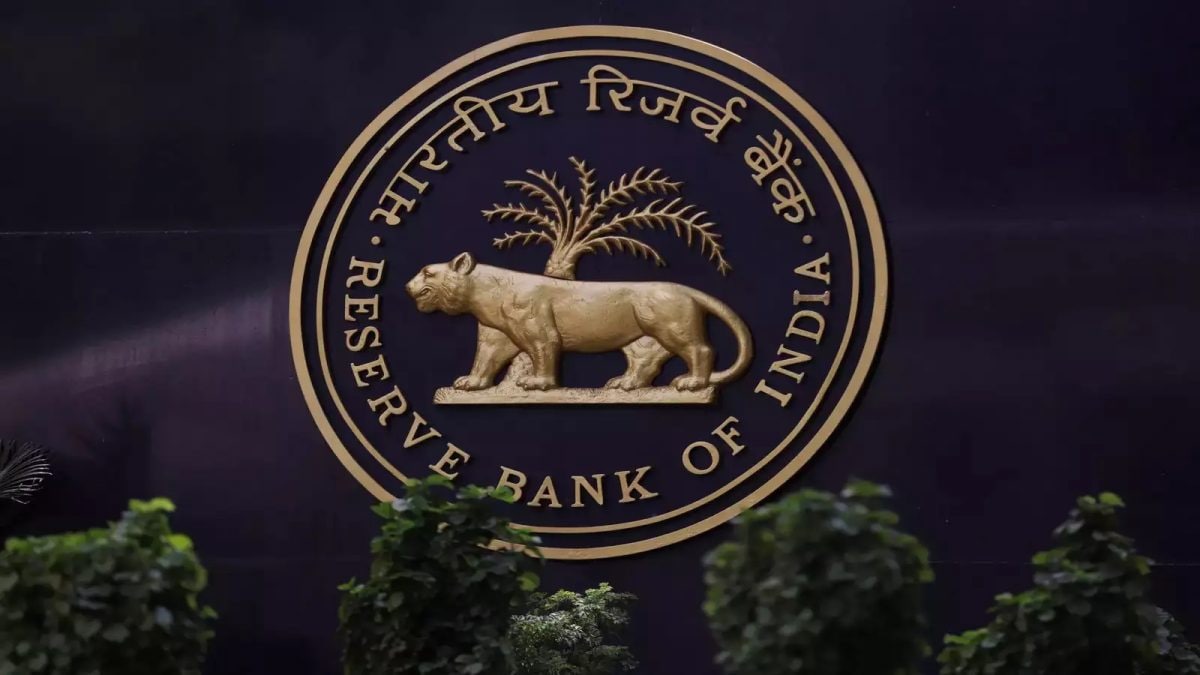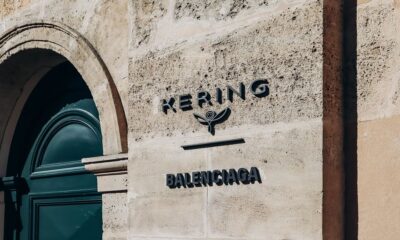Business
FTSE 100 hits another high despite concerns over US government shutdown

The FTSE 100 hit another record high on Wednesday, despite concerns over the US shutdown, as pharmaceutical stocks powered higher, with AstraZeneca up 11% alone.
The FTSE 100 index closed up 96.00 points, 1.0%, at 9,446.43, beating its previous record close on Tuesday.
The blue chip index had earlier set a new best level of 9,457.91.
The FTSE 250 ended 34.14 points higher, 0.2%, at 22,049.70, and the AIM All-Share ended up 3.24 points, 0.4%, at 786.41.
AstraZeneca led the FTSE 100 and rose 11%, regaining its crown as the most valuable FTSE 100 stock from HSBC, while peers Hikma Pharmaceuticals and GSK rose 5.7% and 6.2% respectively.
On Tuesday, the Trump administration announced a deal granting Pfizer a three-year reprieve on planned tariffs as the New York-based, pharmaceutical company vowed to voluntarily lower the prices of unspecified drugs for US purchase.
Under the deal, Pfizer is to charge “most favoured nation” pricing – matching the lowest price offered in other wealthy nations – to Medicaid, the US health insurance program for low-income Americans.
The White House also said it would unveil a website – called TrumpRx – that would allow consumers to directly purchase some medications from manufacturers at discounted rates.
JPMorgan sees Pfizer’s agreement as a potential “bellwether for the sector” which, “we anticipate is likely to be replicated by EU pharma companies and should therefore result in a broadly manageable impact”, from most favourable nation drug pricing, “reassuring investors”.
In economic data, the downturn in UK manufacturing worsened in September as output, orders and employment all fell at sharper rates, survey results from S&P Global showed.
The seasonally adjusted manufacturing purchasing managers’ index dropped to 46.2 points in September from 47.0 in August, marking its lowest level since April and remaining below the neutral 50-point mark for the 12th straight month.
The final figure came in line with the flash estimate published last Tuesday.
Production contracted for the 11th consecutive month, with declines across consumer, intermediate, and investment goods. New orders fell for a 12th successive month, one of the steepest drops in two years, as firms cited subdued client confidence, uncertainty linked to US tariffs, and high energy and labour costs.
Elliott Jordan-Doak, senior UK economist at Pantheon Macroeconomics, said demand for UK manufacturing exports continues to be beset by tariff-related uncertainty, although he thinks the worst of the tariff-related shock has passed.
He only expects manufacturing output to rise slowly over the course of the second half of the year.
The pound was quoted higher at 1.3477 US dollars at the time of the London equity market close on Wednesday, compared to 1.3443 dollars on Tuesday. The euro stood at 1.1729 dollars, up slightly against 1.1727 dollars. Against the yen, the dollar was trading at 147.15 yen, lower compared to 147.98 yen.
The yield on the US 10-year Treasury was quoted at 4.13% stretched from 4.12% on Tuesday. The yield on the US 30-year Treasury stood at 4.72%, widened from 4.69%.
In European equities on Wednesday, the CAC 40 in Paris closed up 0.9%, while the DAX 40 in Frankfurt advanced 1.0%.
Stocks in New York were little changed at the time of the London close. The Dow Jones Industrial Average was up 0.1%, the S&P 500 index was flat and the Nasdaq Composite 0.1% lower.
The US government entered a shutdown at midnight, as Congress failed to strike a deal to keep programmes funded.
Joshua Mahony, analyst at Rostro, said with little sign of progress toward a deal, traders are preparing for the possibility that both jobless claims and Friday’s non-farm payrolls release will be delayed.
He noted that, historically, shutdowns have delivered bouts of volatility, but the precedent has been that weakness tends to be short-lived and presents “buying opportunities”.
“Markets may therefore face turbulence in the days ahead, although historical evidence points towards shutdown declines providing opportunities for bulls that can take advantage of short-term dislocation,” he commented.
Citi analyst Andrew Hollenhorst said the economic drag from the shutdown should be limited, but would become more significant if the shutdown lasts more than two weeks or if a larger number of federal workers are permanently laid off.
“An earlier resolution is possible, but we would not be surprised if this shutdown lasts several weeks,” he added.
With the US jobs report under threat of delay, figures from ADP took on added significance.
According to the payroll services provider, the US private sector shed 32,000 jobs in September, an outcome that fell short of the FXStreet cited expectation of 50,000 additions. In August, 3,000 jobs were lost, in a reading massively revised from an initially reported 54,000 rise in payrolls.
Morgan Stanley said the negative print keeps the Federal Reserve “on alert”, and predicted consecutive quarter point rate cuts through to the January Federal Open Market Committee meeting.
Back in London, JD Sports Fashion rose 6.8% following better-than-expected results from its retail partner, Nike.
Nike rose 5.4% in New York. Its products account for about 45% of JD’s sales and their fortunes are closely linked.
On the downside, Tesco was a weak feature, down 3.6%, ahead of half-year results on Thursday.
On the FTSE 250, Greggs climbed 6.4% after a reassuring trading statement.
The bakery chain said trading had picked up in August and September after the “unusually” hot July had hurt sales.
But analysts said the share price jump reflected the absence of a further profit downgrade, and a short squeeze, rather than a burst of renewed enthusiasm for the company.
Peel Hunt said: “The market will be relieved the update did not bring a downgrade, but the pressure is still to the downside of forecasts.
“Big issues such as the viability of evening trade, the long-term store ambition, and the value-for-money image are still open discussions. There is too much to prove, in our view.”
But Tate & Lyle plunged 12% after cutting sales and earnings guidance amid subdued trading.
Chief executive Nick Hampton said the group has seen a “slowdown in market demand, particularly in the last two months which, in turn, has slowed our recent performance.”
Tate & Lyle now expects full-year sales to be down by low-single digit percent compared to prior hopes for growth at, or slightly below, the bottom of the firm’s medium-term range of 4% to 6%.
Brent oil fell to 65.53 US dollars a barrel on Wednesday from 65.99 dollars late on Tuesday.
But gold remained in demand, trading at 3,862.37 dollars an ounce on Wednesday, up against 3,836.50 dollars on Tuesday.
The biggest risers on the FTSE 100 were: AstraZeneca, up 1,254 pence at 12,436p; JD Sports Fashion, up 6.5p at 101.8p; GSK, up 97p at 1,671.5p; Hikma Pharmaceuticals, up 97p at 1,795p; and Melrose Industries, up 22p at 630p.
The biggest fallers on the FTSE 100 were: Babcock International, down 50p at 1,280p; Tesco, down 15.8p at 429.7p; Coca-Cola HBC, down 110p at 3,394p; Games Workshop, down 330p at 14,200p; and Imperial Brands, down 67p at 3,091p.
Thursday’s global economic calendar has eurozone unemployment data, and US weekly jobless claims figures and factory orders figures.
Thursday’s UK corporate calendar has half-year results from the UK’s largest retailer, Tesco.
Contributed by Alliance News
Business
LSEG boosts returns for shareholders amid activist investor pressure

The London Stock Exchange Group has unveiled plans for a £3 billion share buyback amid pressure from an activist investor and as artificial intelligence fears have hammered the stock.
LSEG said it would follow £2.1 billion in buybacks made last year with another £3 billion by February next year, on top of a hike in dividend payouts.
Details of the pledge to step up returns for investors came as it reported underlying operating profits of £3.51 billion for 2025, up 10.8% or 14.7% higher on a constant currency basis.
On a bottom line basis, pre-tax profits jumped 56.5% to £1.97 billion for 2025.
Shares in the group rose as much as 5% in Thursday morning trading, in a welcome increase after the stock has been battered in recent weeks by global investor concerns over the impact of AI on its firm and data companies more widely.
Shares in the firm, which makes a significant chunk of its earnings from selling access to markets data, have slumped by nearly a third in the past year.
Activist investor Elliott Management has also built up a stake in the firm earlier this month and has reportedly been pushing for more share buybacks as it has held talks with LSEG bosses.
In the face of the recent shares slump, chief executive David Schwimmer said recent results showed “another year of very strong financial performance”.
He said: “In the fourth quarter alone, major financial institutions signed long-term contracts worth £1.9 billion to access our leading data and workflow.”
“With our LSEG Everywhere data strategy, we are positioning ourselves as the partner of choice for licensed, trusted data as the use of AI in decision-making scales – and we are seeing very positive signs of adoption,” he added.
It outlined new performance guidance for 2027 to 2029, with aims to deliver “mid to high single digit” growth in total income and further increase profitability.
Despite taking a significant stake in LSEG, the Financial Times newspaper reported earlier this week that Elliott has made assurances to the UK government over its intentions for LSEG as speculation mounted it would look to push for a break-up of the firm or for it to switch its listing to New York.
Business
Rolls-Royce makes £1 billion more profit after major defence orders

Rolls-Royce has revealed its annual profit surged by £1 billion and upgraded its outlook for the years ahead, following major military aircraft orders and soaring demand for powering data centres.
The engineering giant said its business divisions were in a good place to benefit from “key global trends” over the coming years.
It reported an underlying operating profit of £3.5 billion for 2025, a jump of 40% from the £2.5 billion made the prior year.
Underlying revenues surpassed £20 billion over the year, up about a 10th on 2024.
This was driven by profit and sales growth across its civil aerospace, defence, and power businesses.
Rolls-Royce said demand for its defence products was strong and it secured major orders during 2025.
This included contracts worth more than £1.5 billion with the UK’s Ministry of Defence and the US’s Department of War for EJ200 and AE 2100 engines to power military aircraft.
New orders for the Eurofighter aircraft engines from Italy, Germany and Spain, as well as export agreements from Turkey, will drive production into the 2030s, it said.
Furthermore, Rolls-Royce said it was benefiting from growing demand for power generation, driven by data centres with revenues up by more than a third.
Rolls-Royce said it was now expecting underlying operating profits to increase to between £4.9 billion and £5.2 billion by 2028 following the strengthened financial performance in 2025.
This is significantly higher than the £3.6 billion to £3.9 billion range that it had previously been targeting.
Chief executive Tufan Erginbilgic said growth would not have been possible “before our transformation”, with the business making £600 million worth of cost savings since 2022.
“With our new capabilities and mindset, we have navigated challenges from supply chain to tariffs, and delivered a strong performance in 2025, all while we built the foundations for significant growth for years to come,” he said.
“Based on our 2026 guidance, we expect to deliver underlying operating profit within the prior mid-term guidance range two years earlier than planned.
“Beyond the mid-term we continue to see significant growth from existing businesses as well as from new business opportunities.”
Business
RBI’s Rs 25,000-Crore Switch Auction On March 2nd And Its Impact On Bond Markets, Government Debt Strategy | Explained

Last Updated:
RBI Switch Auction On March 2: The Reserve Bank of India will conduct a government securities switch auction worth Rs 25,000 crore on March 2 between 10:30 AM and 11:30 AM


In the latest exercise, all securities, having maturities in FY27, are being replaced with bonds maturing after FY32.
RBI Switch Auction On March 2: The Reserve Bank of India (RBI) will conduct a government securities switch auction worth Rs 25,000 crore on March 2 between 10:30 AM and 11:30 AM, with results to be declared the same day and settlement scheduled for March 4. The move marks the third such operation this month and is aimed at smoothing India’s future debt repayment profile.
What is a switch auction?
A switch auction is a debt management tool through which the government exchanges bonds that mature soon with bonds that mature later. Instead of repaying investors in cash when near-term securities mature, the government offers them longer-dated securities. This effectively postpones repayment obligations without increasing total debt.
In the latest exercise, all securities, having maturities in FY27, are being replaced with bonds maturing after FY32, according to RBI data.
Why is RBI conducting it now?
The key trigger is the heavy redemption pressure expected in FY27, when government securities worth about Rs 5.47 lakh crore are scheduled to mature. By replacing these with bonds maturing after FY32, the authorities are spreading repayment obligations across future years. This reduces refinancing risk and prevents sudden spikes in borrowing needs.
How does it help the government?
India has already budgeted gross market borrowing of Rs 17.2 lakh crore. Large redemptions in a single year would force the government either to borrow more or use fiscal resources for repayment. Switch auctions smooth this maturity profile, making debt servicing more predictable and fiscally manageable.
What has happened so far this month?
Before this latest announcement, the RBI conducted two switch auctions in which securities worth Rs 84,804 crore were bought back and replaced. The repeated use of this tool signals a proactive debt-management strategy rather than a reactive measure.
Why markets watch switch auctions closely
Bond investors track such operations because they affect liquidity, yield curves and supply of long-term securities. Extending maturities can reduce pressure on near-term yields while increasing supply at the long end, influencing pricing across the sovereign curve.
The broader takeaway
The latest switch auction is part of a deliberate strategy to manage India’s rising debt stock more efficiently. By pushing repayments further into the future and avoiding bunching of maturities, policymakers aim to maintain stability in government borrowing costs and ensure smoother fiscal operations in coming years.
Follow News18 on Google. Join the fun, play games on News18. Stay updated with all the latest business news, including market trends, stock updates, tax, IPO, banking finance, real estate, savings and investments. To Get in-depth analysis, expert opinions, and real-time updates. Also Download the News18 App to stay updated.
February 26, 2026, 11:11 IST
Read More
-

 Entertainment1 week ago
Entertainment1 week agoQueen Camilla reveals her sister’s connection to Princess Diana
-

 Politics1 week ago
Politics1 week agoRamadan moon sighted in Saudi Arabia, other Gulf countries
-

 Entertainment1 week ago
Entertainment1 week agoRobert Duvall, known for his roles in "The Godfather" and "Apocalypse Now," dies at 95
-

 Politics1 week ago
Politics1 week agoTarique Rahman Takes Oath as Bangladesh’s Prime Minister Following Decisive BNP Triumph
-

 Fashion1 week ago
Fashion1 week agoPhilippines expands logistics network to address supply chain issues
-

 Business1 week ago
Business1 week agoAir India and Lufthansa Group sign MoU to expand India-Europe flight network
-

 Fashion1 week ago
Fashion1 week agoFrance’s Kering’s FY25 sales fall; eyes growth & margin recovery
-

 Fashion1 week ago
Fashion1 week agoHSBC Egypt backs Hong Kong textile business mission in Cairo






